Its easy to feel overwhelmed when the news is filled with talk of recessions and economic uncertainty. I remember a few years ago, when my mom lost her job unexpectedly. Suddenly, everything felt precarious. Paying bills, putting food on the table – it felt like a constant worry. It was a stark reminder that financial security isnt guaranteed, and life can throw unexpected curveballs. That feeling of vulnerability, that scramble to figure out what to do next, is something many of us have experienced, or fear experiencing.
That's why I'm so excited to share this curated list of books with you. These aren't just dry economic treatises; they're practical guides, insightful analyses, and hopeful perspectives on navigating tough financial times. Whether you're already feeling the pinch or simply want to be prepared, these books offer valuable tools and understanding. Let's dive in and equip ourselves with the knowledge to weather whatever the economy may bring.
What To Do With Your Money When Crisis Hits: A Survival Guide
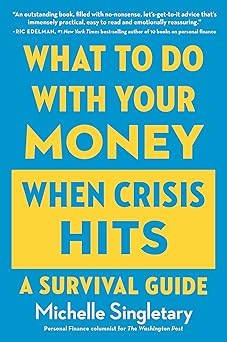
I still remember the feeling of uncertainty and anxiety that gripped me during my first job loss. It was a wake-up call to reevaluate my finances and make some tough decisions. That's when I stumbled upon a book that has changed the way I approach personal finance. The author, Michelle Singletary, is a personal finance columnist who has been through similar experiences and has learned from them. She writes with a voice that is both compassionate and honest, sharing her expertise on how to navigate financial setbacks. Michelle answers many of the most pressing questions that come up when money becomes scarce, such as what bills to prioritize, how to cut back on spending, and how to avoid panicking during economic downturns. She also covers common financial concerns like debt, credit card issues, and cash-flow problems. What I love most about this book is that it's not just about cutting expenses or making sacrifices, but also about making informed decisions that will secure your wealth and future. Michelle's advice is straightforward and actionable, making it easy to apply her strategies to your own life. Whether you're in the midst of a financial crisis or preparing for the next one, this book provides the tools you need to take control of your finances and build a safety net.
Discover this book on Amazon (affiliate link)
How the Financial Crisis and Great Recession Affected Higher Education (National Bureau of Economic Research Conference Report)
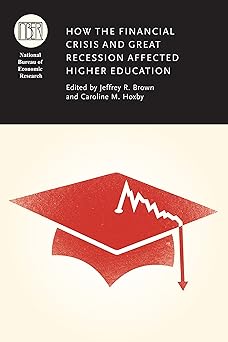
The recent financial crisis had a profound effect on both public and private universities, which faced shrinking endowments, declining charitable contributions, and reductions in government support. Universities responded to these stresses in different ways, and researchers sought to understand the nature of these responses and how the incentives and constraints facing different institutions affected their behavior. The studies presented in this volume explore how various practices at institutions of higher education, such as the drawdown of endowment resources, the awarding of financial aid, and spending on research, responded to the financial crisis. It's heartbreaking to think of institutions that had to make impossible choices between investing in research and meeting their financial obligations, all while trying to maintain quality education for their students. The authors examine universities as economic organizations that operate in a complex institutional and financial environment, where the role of endowments in university finances and the interaction of spending policies, asset allocation strategies, and investment opportunities are crucial factors. What's remarkable about this volume is that it demonstrates that universities' behavior can be modeled using economic principles, providing a new framework for analyzing the complex decisions made by these institutions during times of financial stress.
Discover this book on Amazon (affiliate link)
A Crash Course on Crises: Macroeconomic Concepts for Run-Ups, Collapses, and Recoveries
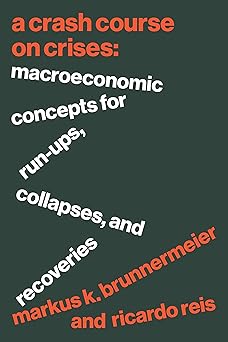
This book is a comprehensive guide to understanding the causes of macroeconomic crises and how policymakers can prevent or mitigate their impact. The author, Markus Brunnermeier and Ricardo Reis, have gathered some of the most recent economic research to shed light on the factors that contribute to these crises. They argue that the seeds of a crisis are often sown in the financial sector and can spread quickly, causing deep and prolonged recessions. The book delves into ten key economic forces, each accompanied by a case study that illustrates how that force played a dominant role in a specific crisis. Brunnermeier and Reis show how debt contracts, banks, and the search for safety can act as triggers and amplifiers that lead to economic collapse. They also explain how monetary, fiscal, and exchange-rate policies can be used to respond to crises and prevent them from becoming persistent. Through a range of case studies, including the 1970s economic crisis in Chile and the COVID-19 pandemic, the authors aim to make these complex concepts accessible to a broad audience. This book is essential reading for anyone interested in understanding the macroeconomic forces that shape our economies and how to navigate the complex web of economic crises.
Discover this book on Amazon (affiliate link)
The Great Reset: How New Ways of Living and Working Drive Post-Crash Prosperity
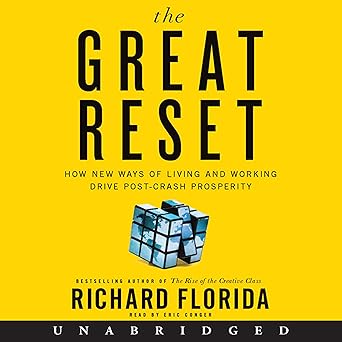
This book is about the times in history when the economy has been going through a great crisis, but also an opportunity to rebuild and create new things. The author, Richard Florida, thinks that these "Great Resets" have been some of the most important times in history, because they have led to new ideas, new inventions, and new ways of living. He believes that these times of crisis have also shown us how to create new paths to prosperity and growth. Florida looks at the past to understand what has happened in the past and what will happen in the future. He thinks that the next Great Reset will be different, but also full of opportunities. He argues that we should be preparing for this future now, by changing the way we live, work, and think. Florida's book is optimistic, but also makes us think about our way of life and what we can do to create a better future. He shows that we have the ability to change and create a brighter future, and that it's time to start working on it. The author also talks about new patterns of consumption, new jobs, and new forms of infrastructure that will shape our future. He believes that we can create a new geography of progress, where people can thrive and have opportunities to innovate and create. This book is not just about economics, but also about how we can create a better world for everyone.
Discover this book on Amazon (affiliate link)
How Markets Fail
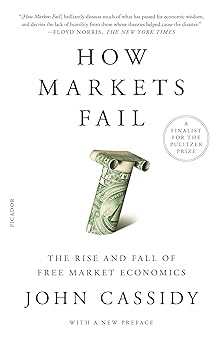
The idea that markets are self-correcting and always efficient is a myth that has led to some of the most egregious economic failures in history. In the years leading up to the 2008 financial crisis, economists and policymakers were convinced that the free market was the ultimate regulator of human behavior, and that governments should only intervene to correct minor imbalances. However, this thinking ignored the countless examples of how markets can and do fail when left unchecked. Cassidy's book is a scathing critique of this ideology, which he calls "utopian economics." Drawing on his own reporting from the field, Cassidy explains how the pursuit of economic growth and profit can lead to devastating consequences, from stock market bubbles to environmental degradation and income inequality. What's most striking about Cassidy's account is how eerily familiar it sounds in the present day, when the same economic theories are being applied with disastrous results. He warns that following these old orthodoxies is not just misguided, but downright dangerous.
Discover this book on Amazon (affiliate link)